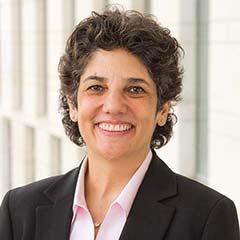With the U.S. Supreme Court’s unanimous reversal earlier this month of a lower court’s ruling in the adoption case E.L. vs. V.L, the Court emphatically defended the Constitution’s Full Faith and Credit Clause, Fordham Law Associate Professor Elizabeth Cooper said. In doing so, the Court made clear that it would not accept the Alabama Supreme Court’s attempt to undermine its landmark marriage equality ruling.
The state’s highest court had ruled in September that V.L. did not have the same parental rights as biological mother E.L. when the same-sex couple split in 2011, even though V.L. had legally adopted their three children in Georgia. In doing so, Alabama’s highest court misapplied Article IV, Section 1 of the Constitution, known as the Full Faith and Credit Clause, and reinterpreted Georgia law despite having no legal capacity to do so, Cooper explained.
Cooper stressed she did not consider E.L. vs. V.L. a gay rights case, but noted the U.S. Supreme Court’s March 7 reversal highlighted marriage equality case Obergefell v. Hodges as the law of the land, lest anyone question the year-old ruling’s legitimacy. The Supreme Court issued its E.L. vs. V.L. ruling without hearing arguments.
“There’s no doubt that the law applied by the United States Supreme Court regarding Full Faith and Credit is very straightforward, and that is what allowed the Court to issue a unanimous decision,” Cooper said, adding Alabama’s ruling would have “wreaked havoc” had the U.S. Supreme Court not reversed it. “There’s also no doubt that the clarity and force of the Court’s decision reinforces the idea the Court is not about to permit the undermining of the legal status of same-sex couples or same-sex-headed households through the side door.”

E.L.’s attorneys argued in Alabama courts that Georgia’s same-sex adoption violated Alabama’s “public policy” as reflected in the state’s constitution, stating any same-sex unions or marriage in other jurisdictions “shall not be considered and treated in all respects as having no legal force or effect in this state.” The Alabama Supreme Court did not address the validity of same-sex marriage in its September ruling, instead asserting that the Georgia court erred in applying its own laws when it granted V.L. status as a legal parent.
The Supreme Court disagreed, stating that Georgia held subject matter jurisdiction over adoption when the couple asked the Superior Court of Fulton County, Georgia, to issue an adoption decree making V.L. a legal parent in 2007. Therefore the substance of the order could not be disturbed under the Full Faith and Credit Clause no matter what state the couple lived in afterward, Cooper explained.
“There is no question that the Alabama Supreme Court’s opinions about families created by same-sex couples got in the way of their applying the law correctly,” Cooper said, expressing confidence the court would have enforced the Georgia adoption order had it involved a heterosexual couple.
In the future, state legislatures and courts likely will provide married same-sex couples the same presumption of parenthood as it affords opposite-sex couples, Cooper said. For now, though, many same-sex parents continue to pursue second-parent adoptions “to secure their legal relationship to the child in case it is ever challenged, particularly if traveling out of the country,” she noted.

